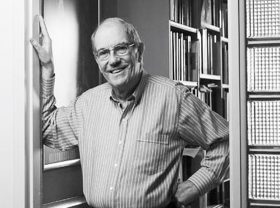Image: Chicago Public Library
What is it that still appeals to me about Shakespeare’s theatre? Its exultation in language, its broad sweep, its outrageousness, its lack of pedantry and its wild fancy, its use of music, colour and action, its robustness, its naivety and unpretentiousness in establishing a simple contract with its audience: ‘On your imaginary forces work…once upon a time…’ The fact that it played so much to its audience, shared their space and had a vital physical contact with them; that it set out to give pleasure and yet dealt with momentous issues…These are just a few of the factors that have made Shakespeare’s theatre the most vital and important since Sophocles and Aristophanes. It’s a writers’ and actors’ theatre. It encourages a freewheeling mix of styles and conventions and is the antithesis of the well-made drawing-room drama. It’s fantastically liberating, and modern audiences can still respond to that and thrill to high-flown rhetoric as long as it’s made comprehensible.
There is no worldwide conspiracy to keep Shakespeare alive. He survives because actors want to go on performing him and audiences want to listen – no matter how often the plays are trotted out and no matter that most productions fall short of excellence. But we keep coming back because there is so much worth grappling with.
A few years back I read about a judge somewhere in the United States who gave young first offenders the option of so many hours’ community service or doing a Shakespeare workshop. Many of them opted for the latter, seeing it as a soft crop. When quizzed by a journalist as to the wisdom of this course, the judge explained: ‘Most of these kids come from poor, depressed areas. When they do a couple of weeks in the Shakespeare workshop they learn a lot about empathy, about team spirit, about creating something. They can be transformed by it.’ When the same journalist went on to interview a couple of the kids in the program, one said: ‘When I go out there in front of my teachers, my folks or my probation officer and I’m doing Mark Antony or Julius Caesar, I feel I’m doing something big, something classy…you learn a bit of self-respect, and once you start to respect yourself, you start to respect other people.’
Something big, something classy…
I guess that’s what I responded to at about the age of fourteen and why I go on responding nearly sixty years later. Judi Dench says her family used to speak of Shakespeare as ‘the gentleman who pays the rent’, and I guess I too have a lot to thank Shakespeare for; not just all those years of transport and delight, but a career, a living and a goal in life culminating in my own Shakespeare company. Despite the many ups and down and scary patches, it has been a most thrilling and satisfying adventure.
As for Shakespeare himself, he remains as elusive as most genius is. We cannot assume any statement that he makes is one of personal conviction, because every thesis is countered by an antithesis. He expresses what his characters believe and think, not what he himself believes. In this he is poles apart from most dramatists who use the medium as a stalking-horse to ambush us with ideology.
Being the son of John Shakespeare, the Mayor of Stratford-on-Avon, William had a first-class education at one of the best Grammar schools in the country. He was taught to debate in Latin and Greek, and to present both sides with equal conviction – great training for a dramatist.
As the author of great narrative poems (The Rape of Lucrece and Venus and Adonis), he earned the patronage of powerful noblemen including the Earls of Pembroke and Southampton. As an actor he was acclaimed by Ben Jonson and played leading roles in Jonson’s comedies and tragedies. With his partners Richard and Cuthbert Burbage he managed his own theatre, The Globe and provided the bulk of it repertoire. The highest accolade for the troupe was its adoption by King James I, making them the King’s Men and earning Shakespeare himself a coat-of-arms and title of Gentleman.
Though most of his career was spent in London or at Court, Shakespeare remained a country man at heart. His plays, poems and sonnets are replete with the sights, sounds and seasons of his native Warwickshire and no other dramatist can match his encyclopaedic knowledge of animals, birds, plants and rustic folklore.
Like Hamlet he seems to have been of a democratic turn of mind, more at home with actors, artisans and common soldiers than stuffy bureaucrats and aloof courtiers, both of whom he satirises mercilessly. Like Prince Hal he seems to have preferred life in the pub to life in the palace.
As a keen observer of men he has no equal: sceptical, compassionate and with a profound sense of humour. He has lasted because his observations hold true, his characters still live and breathe. His vision of life stimulates our own so that (often unwittingly) we continue to see the world through his eyes and speak with his tongue.
To celebrate Shakespeare’s 450th birthday on 23 April, Bell Shakespeare is holding six days of online events in association with Google. To join in go to Bell Shakespeare’s 450th birthday celebration.
To mark the event the company has also produced a video of ordinary Australians reciting Shakespearean lines, emphasising their relevance in everyday situations form the law courts to the lovers’ bedroom.





